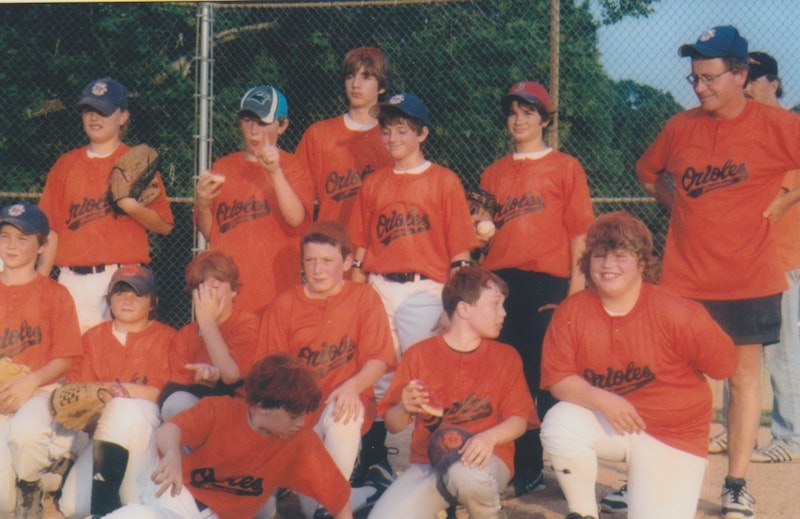There are only two sportswriters today that I read regularly: The Boston Globe’s Alex Speier (not just because I’m a Red Sox fan; his analysis in print and on TV is always illuminating, and while I’d assume he roots for the Sox, he keeps that in check, unlike NESN’s annoying lead broadcaster Dave O’Brien) and The Wall Street Journal’s Jason Gay, who covers all sports, from the NBA, MLB and NFL to Tiddlywinks and bocce tournaments. Gay can get a little silly with his wordplay, but that’s ameliorated by his self-deprecation. I’ve never met the man, but have the feeling he’d make good company.
Gay’s column last Friday was about the high attrition rate among little league umpires, and other sports officials, due to constant harassment from parents, sometimes more than just verbal, and busybodies who take videos of the action and demanding a replay, just like in professional sports. He writes, in context with league presidents around the country imposing rules to tame the obnoxious parents: “Everyone is looking for answers. My son’s fourth/fifth grade basketball team has a ‘seat belt’ rule for when coaches get out of line—they have to sit on the bench and stay there.”
I’ve no idea why any man or woman would want to be an umpire/ref—getting paid peanuts for the grief—unless they consider it a community service. You might ask about Scoutmasters in the Boy Scouts… but today that’s too fraught with creepiness to get into. (I was a Boy Scout in the 1960s and also attended church, and never, thankfully had any untoward advances, same as my four brothers before me at Troop 12 in Huntington. I do wonder, all these years later, about college classmates who attended Jesuit high schools, but never queried any of them.)
My two sons played baseball as kids—I enjoyed the games more than they did—in the late-1990s and early-2000s, and while there were obnoxious parents hectoring their kids—“Lay off the high cheese, Herbie,” was a particularly galling refrain one year from a middle-aged man, still in his suit from work, who chanted that several times a game. His son was a decent player, as I recall, but probably worse off from Dad showing him up when he was at the plate. (The picture above is of my son Booker’s teams one year—he’s at the bottom, head turned with a slice of watermelon. Clues below for the year.)
I sometimes coached third base when no one else was available and was mild-mannered but enthusiastic; I wanted Nicky or Booker’s team to win, but it wasn’t a crusher if the teams lost. One time I was harassed by the president of the local league here in Baltimore, after I wrote a folksy story for The Wall Street Journal about how much I liked the games, making friends with other parents whom I probably wouldn’t have met otherwise, but did include an observation that one of the umpires on a Saturday afternoon was half in the bag.
I was standing behind the home-plate fence, observing, and not only did he reek and sway, but I saw him take swigs, not at all surreptitiously, from a half-pint of bourbon. The day the story was published the president called me at home—rude, I thought, as any calls after nine p.m. are, especially since I was watching a Sox game with Booker and Manny Ramirez was, as the current cliché goes, having a night, spraying balls all over Fenway Park—and yelled at me for 20 minutes for putting the league, in his perception, in a bad light. I paid little attention, other to say that I was a writer and my story, while mostly positive, was accurate. He wasn’t satisfied, suggesting a meeting—to do what, punch me in the nose?—but I nixed that.
When I played baseball for five years as a kid in Huntington, umpires were razzed, but without rancor. The fields we played on were usually bare-bones—maybe a coat of white paint for the baselines, but no dugouts, juice boxes, hot dog stands, flashy gear or excessively obnoxious parents. It was way before the expensive travel leagues that, as Gay notes, drives some of the intensity among the videotaping fools, and almost all the contests started at six p.m., which meant some were called for darkness. Some of my teammates went on to star in high school, most didn’t. I was in the latter category; a middle-of-the-pack infielder who got some hits but couldn’t run a lick. Didn’t matter: I looked forward to each game (unlike the Boy Scouts, which wasn’t my speed, with the authoritarianism, too much nature and a couple of 16-year-old Eagle Scout dicks who led each week’s meeting), and hanging out with guys from other elementary schools. That’s Saturday Evening Post or Boy’s Life territory today.
Clues for the year: Winter Olympics held in Turin, Italy; Michelle Bachelet becomes first female president of Chile (Hillary Clinton goes on a bender); Kelly Reichardt's second feature film is released; Howard Stern moves to satellite radio; North Korea claims it conducted its first nuclear test; Stephen Harper sworn in as Prime Minister of Canada (no one notices); Google buys YouTube for $1.6 billion; Barron Trump’s born and Don Knotts dies; Arctic Monkeys release their debut album; in a further demonstration of the “dumbing down” of the Pulitzer Prizes, The New York Times’ Nicholas Kristoff wins for “commentary”; and Borat is released.
—Follow Russ Smith on Twitter: @MUGGER2023

